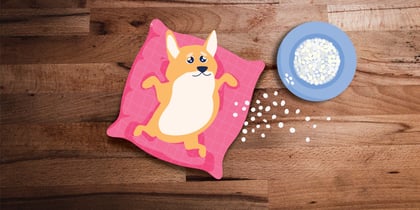Bilious Vomiting Syndrome: A Complete Guide

Table of Contents
Vomiting in dogs is not an uncommon thing, especially in puppies or more senior dogs. Usually, the vomiting is short-term and your dog returns to a normal healthy life. However, when the vomiting goes on for a long period of time or is seen with other signs, it may be a sign of an ongoing issue such as bilious vomiting syndrome.
- Bilious vomiting syndrome is a condition in which dogs vomit bile, usually in the morning or after fasting, and it is believed to be linked to an imbalance of digestive fluids in the stomach.
- The risk of transmissible illness from handling a dog's vomit is low, especially with good hand hygiene.
- If your pet's health issue persists or worsens despite your initial efforts to address it, it's important to seek professional veterinary care as soon as possible.
What is Bilious Vomiting Syndrome (BVS)?
Bilious vomiting syndrome (BVS) in dogs is a condition where a dog vomits bile, typically in the morning or after a long fasting period. This is often accompanied by signs like hunger, nausea, and excessive salivation. It's believed to be caused by an imbalance in stomach acids.
If your dog experiences recurrent episodes, it's crucial to visit a vet for proper diagnosis and management.
What Are the Signs of Bilious Vomiting Syndrome?
The signs of bilious vomiting syndrome can be confused with other causes of vomiting, so a veterinary health check is always recommended to work out the exact cause. Signs to look out for include:
- Vomiting yellow or green fluid
- Vomiting yellow foam
- Vomiting early in the morning or late at night
- Bright and otherwise well no other clinical signs such as diarrhea
- Vomiting stops after feeding
However, not all vomiting is related to bilious vomiting syndrome so signs linked with other causes of vomiting are:
- Lethargy
- Reluctance to eat
- Weight loss
- Vomiting blood or vomiting what looks like coffee grounds
- Diarrhea
- Salivation or drooling
Hassle-free In-Home Pet Sick Visits
When your pet isn't feeling well, the last thing you want is a stressful trip to the vet. Our in-home sick pet visits offer a calm, stress-free alternative.
How is Bilious Vomiting Syndrome Diagnosed?
Diagnosis is usually by ruling out other causes. Visit a veterinarian for a health check-up for your dog. The veterinarian will ask lots of questions about the time of vomiting, duration, and consistency. If you have any photos of the vomit this can be helpful for the veterinarian to see.
The veterinarian may choose to run blood tests, X-rays, or ultrasound among other tests to work out the cause of your dog’s yellow vomit.
Related reading: How Often Should I Take My Dog to the Vet?
How to Treat Bilious Vomiting Syndrome in Dogs
Bilious vomiting syndrome in dogs can be treated through a combination of dietary changes and medications. First, try feeding smaller, more frequent meals throughout the day instead of one or two large meals. You can also add probiotics to improve gut health and eliminate any food allergens or sensitivities from their diet.
It's important to monitor your dog's calorie intake to prevent them from becoming overweight, which can worsen the condition and lead to other health issues such as osteoarthritis. Work with a veterinarian to develop a diet plan that meets your dog's nutritional needs and manages their symptoms.
Summary
Bilious vomiting syndrome is often a diagnosis of exclusion, that is all the other possible causes of vomiting have been ruled out first. The chances of managing this condition successfully are very good if diet and medical therapies are started and consistently followed.
However, this is a lifelong condition so it’s important to realize that accidents will happen from time to time and that is completely expected. If you are concerned that your pet may have bilious vomiting syndrome, schedule a visit your veterinarian.
Should My Pet Be Seen by a Veterinarian?
1. Have you noticed changes in your pet’s appetite?
2. Does your pet have diarrhea or loose stools?
3. Have you noticed changes in your pet’s thirst/water consumption?
4. Is your pet having accidents in the house?
5. Is your pet pacing and unable to settle?
6. Is your pet panting more than usual?
7. Is your pet whining or vocalizing more than usual?
8. Is your pet shaking more than usual?
9. Is your pet hiding or avoiding physical contact more than usual?
10. Is your pet more lethargic and sleeping more than usual?
11. Are you concerned about changes in your pet’s behavior?
12. Is your pet scratching their ears?
13. Is your pet licking their paws more than usual?
14. Does your pet have a rash?
15. Is your pet moving more slowly than usual or having a harder time getting up or down?
View Results
Should My Pet Be Seen by a Veterinarian?
1. Have you noticed changes in your pet’s appetite?
2. Does your pet have diarrhea or loose stools?
3. Have you noticed changes in your pet’s thirst/water consumption?
4. Is your pet having accidents in the house?
5. Is your pet pacing and unable to settle?
6. Is your pet panting more than usual?
7. Is your pet whining or vocalizing more than usual?
8. Is your pet shaking more than usual?
9. Is your pet hiding or avoiding physical contact more than usual?
10. Is your pet more lethargic and sleeping more than usual?
11. Are you concerned about changes in your pet’s behavior?
12. Is your pet scratching their ears?
13. Is your pet licking their paws more than usual?
14. Does your pet have a rash?
15. Is your pet moving more slowly than usual or having a harder time getting up or down?
Share Quiz
Frequently Asked Questions
What types of dogs are predisposed to bilious vomiting syndrome?
There is currently not a lot of evidence as to the predispositions for this condition. One paper suggests male, middle-aged mixed breeds are more likely to get BVS.
Are there any natural anti-nausea medications for dogs?
Natural supplements to ease nausea from vomiting include ginger. Ginger alone may not be strong enough to stop vomiting from Bilious vomiting syndrome but talk to your veterinarian to see if this is a supplement worth adding to your dog’s treatment program.
Should I be concerned about getting ill from handling my dog’s vomit?
The risk for transmissible illness is low, especially if you are healthy and wash your hands thoroughly after cleaning up vomit. Transmissible illness includes bacterial infection, so older or immune-compromised people are at an increased risk, but with good hand hygiene, this risk should still be low.
My dog doesn’t have bilious vomiting syndrome, what home remedies can I try?
For advice on home care for a sore tummy, read our blog for some top tips on how to help your pooch.
I have more than one dog, how do I work out who’s vomiting?
This can be a challenge! If you are waking up to vomit on a regular occurrence, you may need to separate your dogs into different rooms in the house or separate one dog each night for a few nights to see who the affected dog is. Its possible more than one dog may be affected. Another alternative is a home security system for you to watch the footage in the morning to find out who’s affected.






